The Worst Part of a Wall Street Career May Be Coming to an End
Artificial intelligence tools can replace much of Wall Street’s entry-level white-collar work, raising tough questions about the future of finance.
Cutting-edge artificial intelligence tools are revolutionizing the financial industry. Large language models and question-and-answer bots like ChatGPT are rapidly synthesizing information and automating tasks across various sectors. Deutsche Bank, for example, is leveraging its proprietary A.I. tools to instantly answer queries about publicly traded companies and generate concise financial summaries for clients, boosting both their profits and customer satisfaction.
Meanwhile, Goldman Sachs has allocated a team of 1,000 developers to test A.I., including software that can transform massive volumes of text and data into visually stunning bank-branded presentations. This groundbreaking technological advancement is poised to reshape the future of the financial landscape. It’s not just investment banking either; BNY Mellon’s CEO recently revealed that their research analysts can sleep in for an extra two hours thanks to A.I.’s ability to analyze overnight economic data and draft comprehensive reports.
Morgan Stanley is also determined to infuse A.I. into all aspects of their operations, empowering their wealth management division to offer well-off savers optimal investment strategies. While these tools are still undergoing rigorous testing and regulatory scrutiny, they hold the potential to streamline processes and reduce workforce demand. For instance, Bank of America’s CEO acknowledged that A.I. has already enabled them to hire fewer employees. Additionally, Goldman Sachs is on the cusp of developing a game-changing A.I. feature that can effortlessly convert lengthy PowerPoint presentations into formal “S-1” documents required for initial public offerings. Remarkably, this process only takes a fraction of a second.
Read more at The New York Tiimes.






